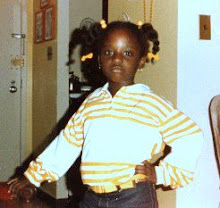Black Barbie Dolls
 Hello Friends,
Hello Friends,I thank you for many of your kind words and emails after precept yesterday. My frustration was rooted in my inability to articulate another dual striving, prevalent among many Black women in the modern American society.
Revisiting our conversation on DuBois:
If, as Black Americans, we are both striving to embrace our ‘Africanness’ and our ‘Americanness’ then what does it mean to be ‘American’ as it pertains to gender roles, and from that, what are Black Americans accepting and rejecting?
I argue that gender roles defined by western ideals are often embraced by Blacks in their American Striving, not as a rejection of the gender roles of traditional African cultures, but as a rejection of the African -American gender roles defined (or redefined) during slavery.
Of that redefinition, in Souls of Black Folk, DuBois states:
“The red stain of bastardy, which two centuries of systematic legal defilement of Negro women had stamped upon his race, meant not only the loss of Ancient African Chastity, but also the hereditary weight of a mass corruption from white adulterers, threatening almost the obliteration of the Negro home.” (page 50)
**(Those highlighted fragments are meant to also introduce the notion that perhaps the Black American woman’s gender identity was rooted in shame. Hmmmm?)
Further, in last weeks precept, we mentioned that the modern day “African”/Black – American striving is more one of the rejection of media imposed images of Black people, than it is a true striving for traditional ‘Africanness’, as the majority of Black Americans are now so far displaced from their African ancestry.
So then, of Black women depicted in the media being degraded as the ‘video hoe’, or often as being, belligerent, and un-kept, what is the alternative that our society and culture offers, as these stereotypes are so widely rejected?
Lastly, Black men have played the largest role in Black women’s pursuits for western ideals of femininity. See Booker T. Washington in Up From Slavery:
“ In order to defend and protect the (white) women and children who were left on plantations when the White males went to war, slaves would have laid down their lives” (page 13)
There is no sweeter notion to many heterosexual Black women than the idea of Black men laying down their lives in protection of us (while a Black man may do this for his wife, mother or sister, do we really see it on a broad level?). Interesting to also note that through her anti-lynching campaign, Wells displayed a willingness to lay down her life (literally, b/c it was threatened in the South) for Black men that were being lynched.
But what does this quote tell us about how Black women must position themselves to be held in that same regard?
I argue that Black women are largely thought to be strong enough to protect themselves. And while many Black women embrace that, and many on-looking White women view this as liberating, there doesn’t seem to be much of a choice in this, as this image of strength is imposed upon us.
This becomes even more problematic, because in recent history, many Black men have achieved ‘American’ ideals of wealth and independence (or so they think), and many many more are still striving for that in this capitalistic structure that we live in. In their pursuit, many are not rejecting western ideals of gender relations, as they are looking more and more to establish “American Households” for themselves and their families. (I am reminded of Dr. Paris’ example of his friend who took “Great Pride” in the fact that his wife never worked) - - think about where that ideal comes from?
Further, I spoke of my own Barbie dolls and canopy bed, simply to create an illustration of how my own father took great pride in the notion of me growing up as a little ‘American Girl’. The idea that his daughter could enjoy those ‘feminine’ luxuries, affirmed that he had, in some way, ‘arrived’.
But what is at stake, in the formation (and reformation) of Black female identities, if we want to support our Black men in this ideal of achievement? Perhaps we shouldn’t, but our American culture has bound us to these ideals of success so much, that their rejection is often equated with failure. (We don’t want our Black men to feel that they have failed –right ladies)
In saying this, I acknowledge that the academy attracts a different kind of thinker, but consider the masses.
I hope that this does a better job of capturing where I was coming from in class yesterday. I welcome your engagement on these issues, as I am still working through these ideas myself, and would greatly benefit from your thoughts and criticism.
Peace and Blessings,
Kim Copeland


0 Comments:
Post a Comment
<< Home